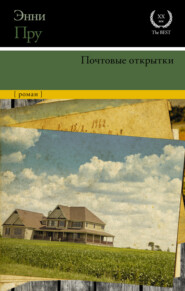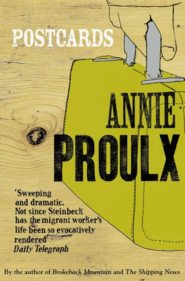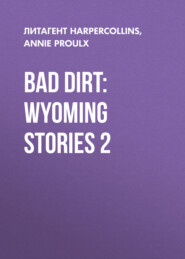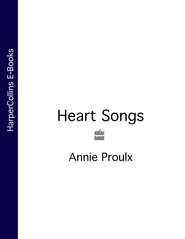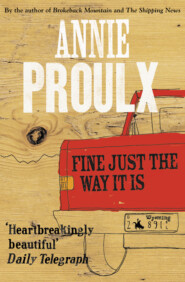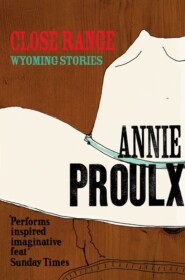По всем вопросам обращайтесь на: info@litportal.ru
(©) 2003-2024.
✖
That Old Ace in the Hole
Автор
Год написания книги
2018
Настройки чтения
Размер шрифта
Высота строк
Поля
Uncle Tam doted on Bob Dollar but had little to offer as proof of affection beyond solicitous attention and gifts of relatively choice treasures from the thrift shop, including the recent brown oxfords.
“Bob! These look like your size, ten double E. Try em on. In a bag of stuff from some Cherry Creek fat cat. Probably the maid dropped them off.”
“They’re great. Now all I need is a sports coat.” In fact the shoes looked odd with Bob’s jeans and T-shirt.
“We got no sports coats you’d be caught dead in, but there is a real nice car coat, suede with shearling lining. Like new, and almost your size. Car coats are kind of old-fashioned now, but it could be useful. You never know. The thing is, it’s a kind of – kind of a tan. Come back in the shop and have a look-see.”
The car coat was tight across the shoulders and the sleeves somewhat short, but there was no denying, despite the lemony color of a bad dye lot, that it was a well-made garment. He lived in dread that on the street someday the previous owner would recognize the coat and make scathing remarks. It had happened twice in school, once when he wore an argyle sweater, once with a knitted cap, the name CHARLES spelled out on the cuff. He had tried to ink the letters out with a marker but they showed plainly enough. Eventually a large black beret with cigarette burn holes turned up and he wore it for years, telling himself some Frenchman had visited Denver and abandoned it there.
“Now, Bob,” said Mr. Cluke, slapping his cheeks with a manly heather aftershave lotion, “you cannot go down to Texas wearing brown oxfords. Take my word for it. I’ve spent enough time down there to know a pair of brown oxfords can set you back with those people. Despite oilmen trigged out in suits, and wealthy wheat growers with diamond rings, the figure of respect in Texas is still the cattleman and the cattleman wants to look like a cowboy. It wouldn’t hurt for you to get a pair of dress slacks and some long-sleeved shirts. But for sure you have got to get yourself a decent pair of cowboy boots and wear them. You don’t need to wear the hat or western shirts, but you got to wear the boots.”
“Yes sir,” said Bob, seeing the logic of it.
“And Bob, here’s a list of the qualities that I want you to look for – on the q.t. – in that country. Look for your smaller cow outfits and farms, not the great big ones or the ranches with four hundred oil wells. Look for areas where everybody is grey-headed. Older. People that age just want to live quiet and not get involved in a cause or fight city hall. That’s the kind of population we want. Find out the names of local people who run things – bankers, church folks – get on their good side. Keep your eyes and ears open for farmers whose kids went off to school and those kids are not coming back unless somebody puts a gun to their heads. Read the obits for rural property owners who just died and their offspring are thinking ‘show me the money’ so they can get back to Kansas City or Key West or other fleshpots of their choice.
“And here’s another thing. You will have to have a cover story because you can’t go down there and say you’re scouting for Global Pork Rind. Some people would be openly hostile. You will be there off and on for several months at a time, so you will have to think up a story to explain your presence. The fellow we had before told people he was a reporter for a national magazine working on a panhandle story – that was supposed to let him get into every kind of corner and let him ask pertinent questions. You know what ‘pertinent’ means, don’t you?”
‘Yes sir. Pertaining to, or related in some way to a topic.”
“Very good, I imagine you did well in school. That fellow I mentioned thought it had something to do with hair implants. Anyway, he thought that was a good cover story and expected doors to open to him like butter.”
“What magazine did that fellow say he was working for, sir? Doing the profile for?”
“Well, he did not pick Texas Monthly, thinking the local populace might have heard of it. And of course it would have been folly to name Cockfight Weekly or Ranch News. I believe he said Vogue. He thought he would be safe with that one in the panhandle.”
“And it didn’t work for him?”
“No, no. It didn’t.” Ribeye Cluke’s little finger swept a speck of shaving cream from his earlobe. “You will have to think of something else. I would stay away from the magazine idea, myself But you’ll think of something. Now, Bob, it’s perfectly fine to stay in a motel for a few days until you get your bearings, but your best bet is to rent a room with someone in the area. Find some old lady or elderly couple with plenty of relatives. That way you’ll get a beeline on what’s happening. You’ll get the lowdown. Now you just scour the properties north of the” – he consulted the map on the wall – ”the Canadian River. Scour them good! Whenever you find a property that looks right and the owner is willing, you let me know and I’ll send our Money Offer Person down. We’ve set up a subsidiary company to buy the parcels and then deed them over to Global. The residents do not know a hog farm is coming in until the bulldozers start constructing the waste lagoon. Later, when you’ve gained experience, when you’ve proved your value to Global Pork Rind, you can act as your own Money Offer Person, though generally we like to send a woman, mention a sum to the oldsters right on the spot. There’s an advantage to that. Another thing, don’t stay in one place, after a month or so switch to another town. And so forth. That fellow I mentioned? He picked Mobeetie, so if I were you that’s not where I’d go. He made people suspicious. He got into trouble.
“Lucille here has made up a packet of maps and brochures, county profiles for you, and there’s your corporate credit card – and you bet there’s a limit on it, Bob. We need your signature on this card. Here you go then and I’ll just wish you good luck. Report back to me by mail every week. And I don’t mean that damn e-mail. I won’t touch that. Get a post office box. Write to me at home and I’ll respond from same so your postmaster down there doesn’t see Global Pork Rind on the envelope and start putting five and five together. I’ll see that the company newsletters are sent to you in a plain brown wrapper. Can’t be too careful. Use a pay phone if there is an emergency.”
“Yes sir.”
“And remember, the thing that’s really important is that – that we – that we do what we do.”
Bob left with the feeling that Ribeye Cluke was somehow deceiving him.
That night he took his uncle Tam to a celebratory dinner at a famous Inuit-Japanese-Irish steak house where they poured melted Jersey butter from quart pitchers, where the baked potatoes, decorated with tiny umbrellas, were the size of footballs and the steaks so thick they could only be cut with samurai swords. His uncle winced at the menu prices, then overpraised the food, a sure sign he was homesick for Chickee’s place down the block from his shop where he could enjoy a plate of fried gizzards or catfish hot pot. But it seemed his thoughts had gone in a different direction, for out on the sidewalk he belched and said, “I’ve been thinking of getting into vegetables. Becoming a vegetarian. Meat’s too damn expensive. Oh. Wait a minute. Before I forget. Wayne sent you something. And there’s a little thing from me.” His uncle thrust two flat parcels at Bob. “Don’t open them until you get there,” he said.
“Bromo! I didn’t even know you were in touch with him anymore.”
“Yeah. I am. We are. Whatever.”
2 ART PLASTIC (#ulink_703fd2fb-addf-5bee-b5fb-1916782440df)
At the time Bob’s parents had dropped him off on the doorstep, Uncle Tam had had a roommate, Wayne Redpoll, with glary eyes and a rubbery mug, his features arranged around a nose so beaked that it made his eyes unmemorable. His brown hair was crinkled and violent, springing with energy. In the mornings before ten o’clock when the shop opened, he lounged around without a shirt doing crossword puzzles, tapping the pencil against his discolored teeth. His chest was strange, the nipples almost under his armpits. He was not good at the puzzles, too impatient for them, and after a few minutes would go his own way, filling in the blanks with any old word, right or wrong. Bob disliked him mildly and it was partly to vanquish him at crosswords that he began to study The Child’s Illustrated Dictionary which Uncle Tam had fished out of a box and handed to him, saying, “Happy congratulations on this great Wednesday morning.” By the time he was twelve he could do the Tuesday New York Times puzzle with a pen in less than twenty minutes, but Thursday and Friday took many hours with pencil as the clues were sly and presumed knowledge of cultural events in the dim past. All kinds of words streamed through his mind – ocelot, strabismus, plat du jour, archipelago, bemusement, vapor, mesa, sitar, boutique. Wayne tried to counter Bob’s skill by dredging up odd crossword information and explaining it to him as though that were the point of the puzzles: that crosswords had been invented in 1913 by a Liverpool newspaperman, that in 1924 they became a national craze. He generally pooh-poohed the New York Times puzzles, which, he said, were child’s play – a meaningful look at Bob – compared to the evil puzzles of the British, particularly those with cryptic clues constructed by the old masters, Torquemada, Ximenes and Azed. But this persiflage did him no good. He did not have the knack and Bob did.
Wayne Redpoll had come by the nickname “Bromo” after a night of heavy drinking not long after Bob Dollar arrived on the doorstep. He moaned with a hangover, drank black coffee to restore balance, said, “Goddamn, I’m going for a walk to clear my head,” ended at Chickee’s place down the street where he ordered a Bromo-Seltzer to settle his queasy gut. He swallowed the gassy mixture and within seconds puked on the counter.
He had a habit of holding his words behind his teeth, only letting them escape through the narrowest possible opening of his jaws, which gave his conversation a constricted sibilance. He had many dislikes. He hated the “drink milk” campaign that showed celebrities holding empty glasses of milk, their upper lips white with the stuff as though they drank like tapirs. Hijackers aside, he loathed flying, especially the attendants’ merry commands to pull down the window shades so other passengers could watch grade-Z American movies. He refused to lower his shade, saying that the only pleasure in flying was the chance to look at the landscape from thirty-five thousand feet. Once he had been put off the plane in Kansas City for daring to argue about it. Tam had driven hundreds of miles to pick him up and listened all the way back to Bromo’s rant about the horrible streets he had walked through while waiting. Phrases offered to the grief-stricken, such as “time heals all wounds” and “the day will come when you reach closure” irritated him, and there were times when he sat silent, seeming half-buried in some sediment of sorrow.
“Closure? When someone beloved dies there is no ‘closure.’”
He disliked television programs featuring tornado chasers squealing “Big one! Big one!” and despised the rat-infested warrens of the Internet, riddled with misinformation and chicanery. He did not like old foreign movies where, when people parted, one stood in the middle of the road and waved. He thought people with cell phones should be immolated along with those who overcooked pasta. Calendars, especially the scenic types with their glowing views of a world without telephone lines, rusting cars or burger stands, enraged him, but he despised the kittens, motorcycles, famous women and jazz musicians of the special-interest calendars as well.
“Why not photographs of feral cats? Why not diseases?” he said furiously. Wal-Mart trucks on the highway received his curses and perfumed women in elevators invited his acid comment that they smelled of animal musk glands. For years he had been writing an essay entitled “This Land Is NOT Your Land.”
Even though they did not get along, Bromo had opened a charge account for Bob at the local bookshop where he was allowed to buy one book every two weeks. Bob’s longing for the books had overcome his dislike of any obligation to Bromo.
When donation boxes came to the shop’s doorstep he offered scathing criticism of the contents. Once a strange garment arrived in a box stamped OUTDOOR GRILL DELUXE. It was an enormous vest made of an unidentified fur, coarse, long and brownish grey. It smelled of old smoke and mothballs.
“A beast!” cried Bromo in mock horror, backing away from it. “Good God, that’s something from the sixties, some mountain commune garment. Feel in the pockets, Tam, see if there’s any drugs.”
The pockets were empty. Bromo disliked the vest, which reminded him of paisley skirts, peace signs, girls doctoring their children with coltsfoot and yarrow; he was particularly irked at being unable to identify the fur. At last he could stand it no longer, wrapped the vest up, took it to the Denver Natural History Museum.
“Pass the macaroni, Bob,” said Uncle Tam that evening. Then, to Bromo, “Aren’t you going to tell us what they said at the museum?”
“You really want to know?”
“Of course I want to know. It’s a very unusual fur.”
Bromo snorted. “You can say that again. It’s also highly illegal. It is grizzly bear fur.”
“Oh no,” said Uncle Tam who was an ardent environmentalist with lifetime subscriptions to Audubon, High Country News, Mother Nature, Wildlife of the Rockies and Colorado Wildlife.
There followed a long discussion – argument – about what to do with “the Beast,” as Bromo persisted in calling it. In the end it got a spotlighted solo place on a table with a sign reading UNIQUE BEARSKIN VEST and a price tag of $200.
The two men were housemates and business partners and, Bob wondered a few years later, if perhaps not something more, for there was in their relationship an odd intimacy that went beyond household or business matters. Yet he had never seen any affectionate glances or touching between them. Each man had his own bedroom at opposite ends of the upstairs hall. But neither did they ever bring women to the house. It was a poor bachelor establishment (though tidy and well-dusted), for the partners made very little money. In the end Bob decided that the sexual gears of both men (and perhaps his own) were engaged in neutral, except for one peculiar and inexplicable memory of Bromo Redpoll in Santa Fe sitting on the hotel shoeshine throne for the third time in one day, an expression on his face that nine-year-old Bob could only characterize as “adult,” while a Mexican boy snapped his rag over a glossy wingtip. When Bob was older he grasped the sexual content of that expression and he had a word for it – concupiscence – for he had seen it on his own face, though not in longing for a shoeshine boy, but for the sluts of Front Range High, as distant to him as calendar photographs. He imagined himself with a sultry, curly-headed, dimpled girl, but it had not worked out that way. Bob was not tall but by some stroke of genetic luck he was well-proportioned with smooth musculature, a hard little ass and boxy shoulders. As Bob matured, the unbidden thought had come to Tam that the boy was, as Wayne might say, “a casserole.”
There were no dimpled girls with curly hair at Front Range High and in his junior year he had been picked out by a big, unclean girl with a muddy complexion, Marisa Berdstraw, who wore lipstick of a dark red color that made her teeth glow beaver yellow. She had quickly inveigled him into a sexual servitude with all the declarations and trappings of professed love but none of the reality. This meant going steady, studying together, a Friday or Saturday night movie, a sex grapple on Sunday mornings when her parents, both with mottled, rough faces, were at church. He did what she said and she had a pattern of events and behavior worked out in her mind. She would call up in the evening.
“What ya doin?”
“Studying for a social studies test.”
“I got a test too. In Diagonals. But I’m not studyin for it. It’s more like a quiz.”
Diagonals was an experimental course that darted tangentially from subject to subject as classroom discussion ranged. It had started off as a geology unit, veered to Esperanto, slid to the court of Louis XVI, on to the Whiskey Rebellion, the Oklahoma land rush, then to fractals, to oil tanker construction and, most recently, to mathematical calculation with an abacus.
“Only three more days till Sunday,” she said archly.
“Yeah.”
“Are you glad?”
“Glad about what? That there’s three more days?”
“That it’s only three more days.”






